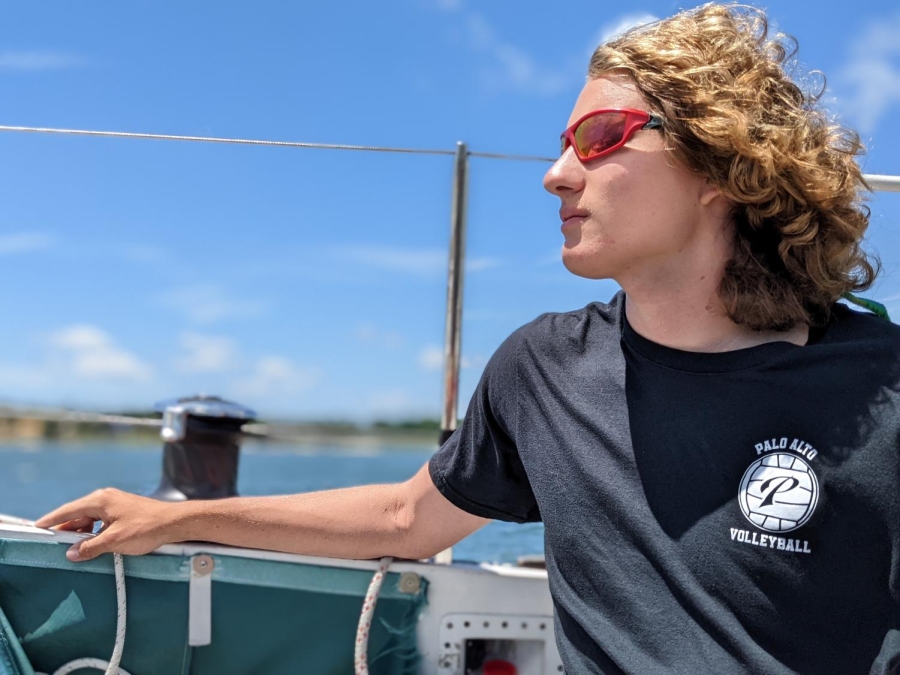Atlantic voyage: Junior makes history with his solo sailing trip
PENCHANT FOR ADVENTURE — Palo Alto High School junior Cal Currier gets ready to set sail on his historic journey. “I was motivated by a love for adventure,” Currier said. “I wanted to do something really fun.” Photo courtesy of Cal Currier.
I did not realize how bored I was going to be,” Palo Alto High School junior Cal Currier remarked about his history-making journey. “I could not even fathom that I would go through five books in two days.”
Currier is the youngest person in history to complete a solo transatlantic sailing trip from west to east. If that was not impressive enough, he had only begun sailing seven months before setting out on his own at the age of 16.
“I was motivated by a love for adventure,” Currier said. “I wanted to do something really fun.”
Currier comes from a family of ardent sailors. His maternal grandfather completed two transatlantic trips with a crew himself. The early exposure Currier gained to the sport made his groundbreaking voyage seem feasible to him. He originally thought up the idea with family members over Thanksgiving break.
“I was with my older brother and my dad, and we were driving in the car,” Currier said. “We were like, ‘What should we do this summer?’ I forgot who came up with the idea, but I locked onto it and started pursuing it with regularity.”
While he received support from his parents and brother from the start, his grandfather was initially hesitant, despite having completed the journey himself.
“This didn’t fit into his idea of what someone should do when they just started sailing seven months ago,” Currier said. “He’s been sailing since he was four years old, constantly every day until he was 19. Only then did he attempt a transatlantic with seven other people. That’s how you’re supposed to do it. That’s the New England way.”
Eventually, however, Currier’s grandfather began helping him prepare, though Currier said neither he nor his grandfather believed he would complete the journey.
“I thought it was just going to be fun to prepare to do it,” Currier said “And then if it did not happen, do it next time.”
As time passed, however, Currier’s hard work in training began to pay off, and his ambitious goal seemed within reach though there was never any real pressure to attempt the trip if he did not feel ready.
“The goal was to get ready to do it and learn the process,” Currier said. “It was about the journey, not the destination.”
Before setting off, Currier and his dad spent time planning for possible challenges Currier might face while sailing.
“The worst thing that could happen is I get dismasted, and then I need to float out in the ocean,” Currier said. “The regularity of tankers was such that even if I fell off the side, I still had a high chance of survival.”
After months of training, Currier embarked on his solo journey, starting on the east coast, and arriving in Europe as planned eighteen days later, only stopping for resupplying at the midpoint islands called the Azores. Despite Currier and his family’s efforts to account for any possible challenges, Currier did not anticipate how much boredom he would endure while conquering the seas.
However, looking back now, Currier said there was a benefit to the solitude.
“I’ve grown less self conscious because when you’re alone there’s no one to compare yourself to,” Currier said.
In hindsight, Currier said the months of preparation for the trip and the trip itself helped him forge a distinct identity for himself separate from his family and recommends others embark on their own solo journey.
“I think that everybody needs a little time by themselves … away from organization,” Currier said. “Everybody needs their time in the wild.”



